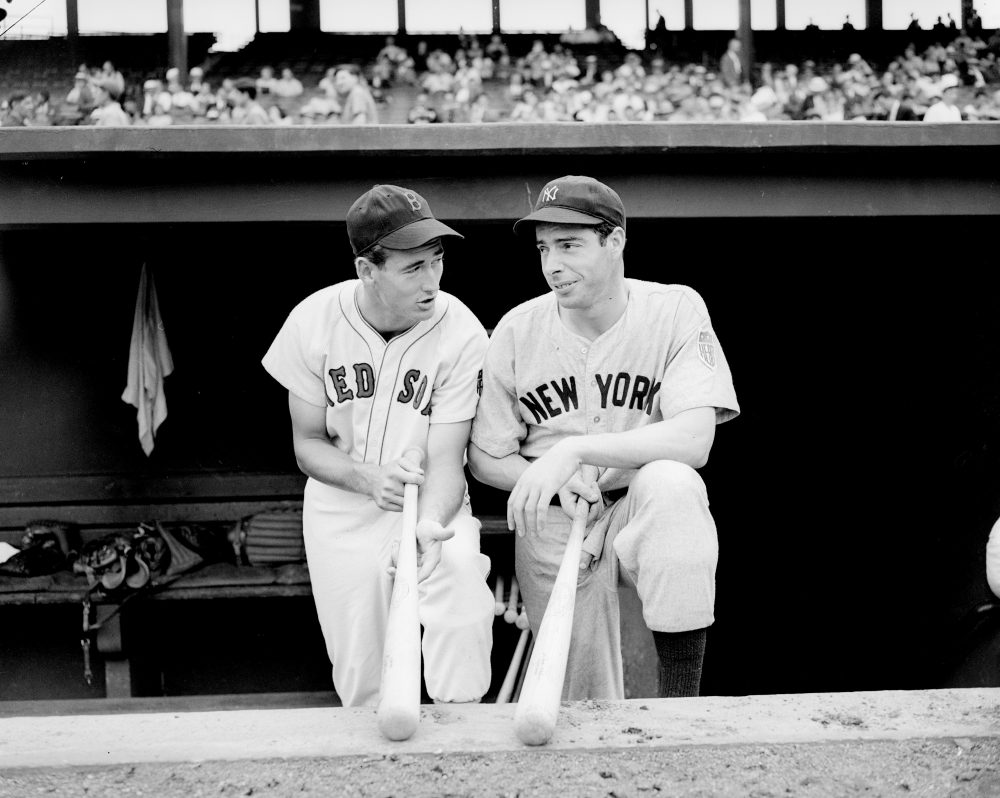
- Storylines Heading Into Cleveland Browns Training Camp - July 19, 2024
- June MLB Power Rankings - July 3, 2024
- May MLB Power Rankings - June 4, 2024
In sports, history is ever changing with moments that define an era. However, it also leaves the question of “what if” said moment didn’t happen. Everything from what if player X wasn’t traded for player Z to what if a moment didn’t happen.
The first two moments looked at “what if LeBron James was drafted by the Memphis Grizzlies” and “what if the San Diego Chargers didn’t trade the first overall pick in the 2001 draft?”
In this edition, we examine what could have happened if two of the biggest rivals in sports traded two of their iconic names and border line faces of their franchise. What if the Boston Red Sox traded Ted Williams to the New York Yankees for Joe DiMaggio?
The Scenario:
In the 1947 offseason, Boston owner Tom Yawkey had met with New York general manager Larry McPhail for drinks. In the course of that discussion, one of the biggest talking points was the idea of the New York Yankees trading outfielder Joe DiMaggio to the Boston Red Sox for outfielder Ted Williams. The trade was agreed upon and it would last until morning.
The next day, Yawkey asked that New York throw in another player, a rookie left fielder named Larry Berra. New York would end discussions and the trade was nullified.
Williams would go onto play until 1960 where he would win another Most Valuable Player award, three batting championships and make the All-Star team all but one year. DiMaggio would play until 1951 before injuries caught up to him. In that time he would lead the American League in home runs and runs batted in during the 1948 season.
However it’s more a question of what the deal breaker, Larry Berra, did. Starting that year, he would be moved to catcher and never miss an All-Star game. He would win three MVPs and 13 World Series. He wouldn’t go under the name Larry, though.
He was better known as Yogi Berra.
That leads us to: what if the DiMaggio-Williams trade happened?
The Immediate Impact:
As crazy as it sounds, this trade would actually help both players and their respective teams. The short porch in right field at “old” Yankee Stadium would have allowed Williams to hit more home runs.
Williams had a .309 batting average, 30 home runs and 93 RBI in 157 games played at Yankee Stadium. If the sample size increased, there’s a chance that he would have been less likely in the conversation for the greatest hitter of all-time but rather he would be the undisputed greatest hitter of all-time.
Meanwhile in Boston, there’s a chance in the period before DiMaggio retired that they’d win a World Series. The line up already featured hall of fame players and legends such as second baseman Bobby Doerr, third baseman Johnny Pesky and outfielder (and his brother) Dom DiMaggio. Add Joe DiMaggio to that group with his statistics and you’d have a much better team than most would think.
DiMaggio would have shined at Fenway Park more than Yankee Stadium as well. In 120 games at Fenway Park, he had a batting average of .334, 29 home runs and 113 RBI. The greatest advantage though, was that he was a right handed hitter. He would have had the Green Monster (the big wall in left field) to get a higher average and possibly hit even more home runs since Fenway Park is smaller than Yankee Stadium.
The Ripple Effect:
Williams would have also provided New York with more longevity as he played for another 12 years. Though Micky Mantle would take over the next year, it would have given New York something they wouldn’t have until 1960, a second threat in the outfield. Williams and Mantle would have been a huge threat until Williams retired and Roger Maris took his place.
Boston would have to wait until 1961 before DiMaggio’s replacement emerged. In that time, they had a couple of all stars like second baseman Billy Goodman and infielder Pete Runnels but they nonetheless struggled. This team would have been a bottom feeder.
While it would amplify the accomplishments of the 1967 “Impossible Dream Team” Boston Red Sox, who had the first winning season since 1958, the immediate impact of the trade would likely have caused them to have more losing seasons. This trade had more of the makings of the modern era of baseball as a must-win season trade or trade deadline deal. It would not be seen as a trade to build the franchise around.
The Final Assessment:
If this trade happened, it would have helped Boston immediately while destroying them in the long term. Meanwhile New York would have enjoyed another period of dominance. However, that leads to a second what if: what if Yogi Berra was included?
If Berra was included, that would have balanced out the trade as Boston would have their catcher for the next at least decade. While not the best hitter at Fenway Park (.265 average, 16 home runs and 86 RBI in 146 games) it would have been his leadership and ability to manage a game behind the plate that would have defined him.
It would also have taken away from New York the guy who knew how to work with their pitchers, meaning that moments like Don Larsen’s perfect game in the 1956 World Series may not have happened. Even more damaging, he holds the all-time record for shut outs caught with 173.
That would have been the only way this trade would have worked out. Yawkey was right to ask for Berra at the time, as the long term effects would have crippled Boston otherwise. It may have been for the best that the Yankee Clipper was not exchanged for the Splendid Splinter.




